The Life of Saint John Chrysostom

The legion of saints of the Church is comprised of men of extraordinary ability whose talents may have been dissimilar but many of whom seem to have shared a common genius for oratory. Yet out of this vast assembly of eloquent speakers, whose reputation might have rested on their gift of expression alone, the one for whom the title "Chrysostom" (in Russian, "Zlatoust"), or "golden-mouthed" was reserved, was John of Antioch, known as St. John Chrysostom, a great distinction in view of the qualifications of so many others.
Endeared as one of the four great doctors of the Church, St. John Chrysostom was born in 347 in Antioch, Syria and was prepared for a career in law under the renowned Libanius, who marveled at his pupil's eloquence and foresaw a brilliant career for his pupil as statesman and lawgiver. But John decided, after he had been baptised at the age of 23, to abandon the law in favour of service to the Saviour. He entered a monastery which served to educate him in preparation for his ordination as a priest in 386 AD. From the pulpit there emerged John, a preacher whose oratorical excellence gained him a reputation throughout the Christian world, a recognition which spurred him to even greater expression that found favour with everyone but the Empress Eudoxia, whom he saw fit to examine in some of his sermons.
The Life of the Great Martyr Saint Minas
“We went through fire and through water; but thou broughtest us into a wealthy place” (Psl, 66,12)
 Saint Minas was born in Egypt in the middle of the 3rd century. His parents were heathen, yet the heathen family atmosphere did not harden his heart. Minas became Christian, when he was still in his teens. When he came of age, he opted for the military career. His unit stationed in Cotyaeion in Asia Minor. Minas excelled in wisdom and courage and therefore he stood high in officer’s estimation.
Saint Minas was born in Egypt in the middle of the 3rd century. His parents were heathen, yet the heathen family atmosphere did not harden his heart. Minas became Christian, when he was still in his teens. When he came of age, he opted for the military career. His unit stationed in Cotyaeion in Asia Minor. Minas excelled in wisdom and courage and therefore he stood high in officer’s estimation.
But unfortunately three centuries after the Advent, people didn’t wish to accept the redemptive message of Christ’s resurrection. The Roman authorities began again “to kick against the pricks” (Act 26,14) Diokletian and Maximian, the emperors of Rome, ordered percecutions of the Christians, which lasted from 303 to 311. The Roman soldiers were ordered to arrest and to torment the Christians in order that they recant. That was the critical moment of Saint’s life, but his faith prevailed upon the worldly reason. He left the army, he retired to a solitude in the mountains and he led an ascetic’s life. He preferred the wild animal’s company rather than the pagan’s one. He wandered “in deserts and in mountains and in dens and caves of the earth” (Hebr. 11,38) and served God by fasting, vigils and prayer.
The Life of St. Stephen of Decani, King of Serbia
 St. Stephen of Decani was born as the eldest son of the saintly King Milutin (Stephen Uros II) and his wife Elizabeth, a Hungarian princess. Living at the court of his parents, the heir-apparent received a good education, his mind exercised by study of the language and writings of his people, and his heart strengthened by study of the Holy Scripture and the teachings of the Orthodox Faith.
St. Stephen of Decani was born as the eldest son of the saintly King Milutin (Stephen Uros II) and his wife Elizabeth, a Hungarian princess. Living at the court of his parents, the heir-apparent received a good education, his mind exercised by study of the language and writings of his people, and his heart strengthened by study of the Holy Scripture and the teachings of the Orthodox Faith.
The good fruit of his upbringing proved itself when King Milutin was forced to send him as hostage to the Tartar chief Nogyi. In spite of the potential dangers, Stephen was obedient to his father's will and did not resist, trusting his life to the Lord. And his hope was not in vain. He eventually made friends with one of the Tartar nobles, who succeeded in assisting his safe return home.
Feast of the Translation of the Relics of Saint George
 On this day we commemorate the translation of the relics of St. George, from Nicomedia, where he suffered at the time of Emperor Diocletian, to the city of Lydda in Palestine. The suffering of this wonderful saint is described on April 23. Anticipating his martyrdom, St. George begged his servant to take his relics to Palestine, where his mother had been born, and where he had distributed his large estate to the poor. The servant did so. During the reign of Emperor Constantine, pious Christians built a beautiful church to St. George in Lydda and, upon the consecration of that church, the relics of the saint were interred there. Innumerable miracles have occurred from these miracle-working relics of St. George, the great-martyr of Christ.
On this day we commemorate the translation of the relics of St. George, from Nicomedia, where he suffered at the time of Emperor Diocletian, to the city of Lydda in Palestine. The suffering of this wonderful saint is described on April 23. Anticipating his martyrdom, St. George begged his servant to take his relics to Palestine, where his mother had been born, and where he had distributed his large estate to the poor. The servant did so. During the reign of Emperor Constantine, pious Christians built a beautiful church to St. George in Lydda and, upon the consecration of that church, the relics of the saint were interred there. Innumerable miracles have occurred from these miracle-working relics of St. George, the great-martyr of Christ.
Among the countless miracles of St. George, this one is recorded: On the island of Mytilene there was a church dedicated to St. George the Great-martyr and Trophy-bearer. All the inhabitants of the island would come to this church on the annual feast of their patron saint. Knowing of this, the Saracens of Crete once attacked this island on its feast day, pillaged the island, and enslaved its inhabitants, taking many of them back to Crete.
November 1: Saints Cosmas and Damian the Holy Unmercenaries and their Mother Theodota
Cosmas and Damian were unmercenaries and miracle-workers. They were brothers both in the flesh and in the spirit, born somewhere in Asia Minor of a pagan father and a Christian mother. After their father’s death, their mother Theodota devoted all her time and effort to educating her sons and raising them as true Christians. God helped her, and her sons matured as sweet fruit and luminaries of the world. They were learned in the art of medicine and ministered to the sick without payment, not so much with medicine as by the name of the Lord Jesus Christ. They were called “unmercenary physicians,” that is, unpaid physicians, for they healed freely and thus fulfilled the commandment of Christ: Freely ye have received, freely give (Matthew 10:8). So careful were they in healing men free of charge that Cosmas became very angry with his brother Damian because he accepted three eggs from a woman, Palladia, and ordered that he not be buried alongside his brother Damian after his death. In fact, St. Damian did not accept these three eggs as a reward for healing the ailing Palladia, but rather because she adjured him in the name of the Most-holy Trinity to accept these three eggs. Nevertheless, after their death in the town of Fereman, they were buried together according to a revelation from God. The holy brothers were great miracle-workers both during their life and after their death. A snake crawled through the mouth and into the stomach of a certain farm laborer during his sleep, and the unfortunate man would have died in the greatest pain had he not, in the last moment, invoked the help of Saints Cosmas and Damian. Thus, the Lord glorified forever the miracle-working of those who glorified Him on earth by their faith, purity and mercy.






